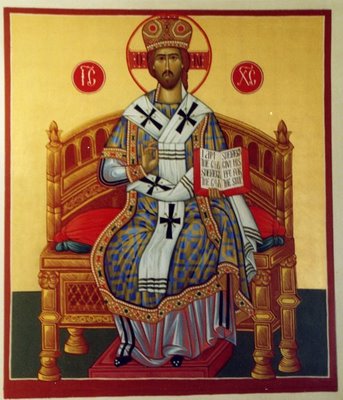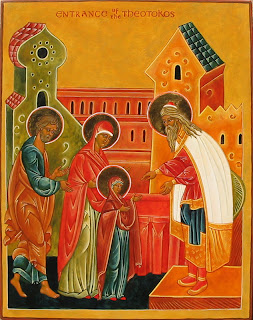St Cyril of Jerusalem
| The twofold coming of Christ |
|---|
| |
|---|
We
do not preach only one coming of Christ, but a second as well, much
more glorious than the first. The first coming was marked by patience;
the second will bring the crown of a divine kingdom.
In general, whatever relates to our Lord Jesus Christ
has two aspects. There is a birth from God before the ages, and a birth
from a virgin at the fullness of time. There is a hidden coming, like
that of rain on fleece, and a coming before all eyes, still in the
future.
At the first coming he was wrapped in swaddling
clothes in a manger. At his second coming he will be clothed in light as
in a garment. In the first coming he endured the cross, despising the
shame; in the second coming he will be in glory, escorted by an army of
angels.
We look then beyond the first coming and await the second. At the first coming we said: Blessed is he who comes in the name of the Lord. At the second we shall say it again; we shall go out with the angels to meet the Lord and cry out in adoration: Blessed is he who comes in the name of the Lord.
The Saviour will not come to be judged again, but to
judge those by whom he was judged. At his own judgement he was silent;
then he will address those who committed the outrages against him when
they crucified him and will remind them: You did these things, and I was silent.
His first coming was to fulfil his plan of love, to
teach men by gentle persuasion. This time, whether men like it or not,
they will be subjects of his kingdom by necessity.
The prophet Malachi speaks of the two comings. And the Lord whom you seek will come suddenly to his temple: that is one coming.
Again he says of another coming: Look, the Lord
almighty will come, and who will endure the day of his entry, or who
will stand in his sight? Because he comes like a refiner’s fire, a
fuller’s herb, and he will sit refining and cleansing.
These two comings are also referred to by Paul in writing to Titus: The
grace of God the Saviour has appeared to all men, instructing us to put
aside impiety and worldly desires and live temperately, uprightly, and
religiously in this present age, waiting for the joyful hope, the
appearance of the glory of our great God and Saviour, Jesus Christ. Notice how he speaks of a first coming for which he gives thanks, and a second, the one we still await.
That is why the faith we profess has been handed on to you in these words: He
ascended into heaven, and is seated at the right hand of the Father,
and he will come again in glory to judge the living and the dead, and
his kingdom will have no end.
Our Lord Jesus Christ will therefore come from heaven.
He will come at the end of the world, in glory, at the last day. For
there will be an end to this world, and the created world will be made
new.



